托福作文常用谚语
托福谚语

托福谚语导读:本文是关于托福谚语,如果觉得很不错,欢迎点评和分享!1、脚踩两只船。
2、无风不起浪。
3、君子之交淡如水。
4、不遗余力。
5、勤劳之人不受穷。
6、一招鲜,吃遍天。
7、活到老,学到老。
8、脚踏实地。
9、习惯成自然。
10、机不可失,时不再来。
11、既往不咎。
12、爱屋及乌。
13、好了伤疤忘了疼。
14、天外有天,山外有山。
15、熟能生巧。
16、谋事在人,成事在天。
17、好聚好散。
18、活到老学到老。
20、殊途同归。
21、客随主便。
22、老马识途。
23、趁热打铁。
24、功夫不负有心人。
25、酒后吐真言。
26、塞翁失马,安知非福。
27、和气生财。
28、将计就计。
29、东奔西跑,还是家里好。
30、人的欲望无止境。
31、比上不足比下有余。
32、不眠之夜。
33、一回生,二回熟。
34、少壮不努力,老大徒伤悲。
35、同舟共济。
36、礼多人不怪。
37、不以物喜不以己悲。
38、车到山前必有路。
39、家书抵万金。
40、教养胜过天性。
42、知足常乐。
43、心有灵犀一点通。
44、拆东墙补西墙。
45、笨鸟先飞。
46、天网恢恢,疏而不漏。
47、人心各不同。
48、金玉满堂。
49、海内存知己,天涯若比邻。
50、别在河流中间换马。
51、开卷有益。
52、眼不见,心不烦。
53、吃一堑,长一智。
54、千里之行始于足下。
55、大事化小小事化了。
托福写作15个实用谚语句式汇总分享
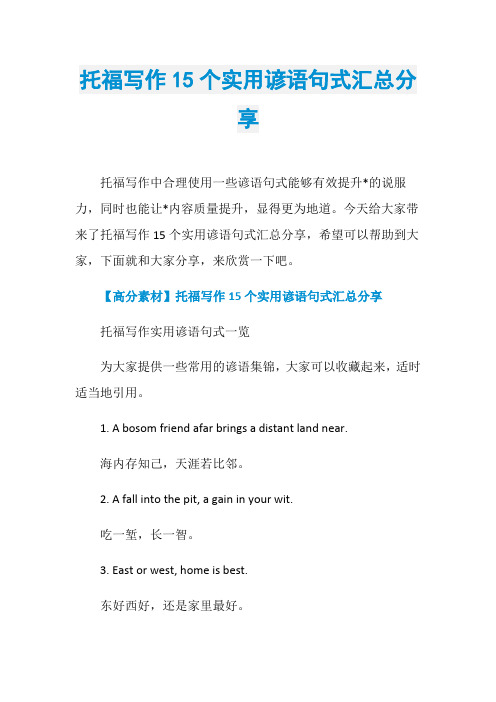
托福写作15个实用谚语句式汇总分享托福写作中合理使用一些谚语句式能够有效提升*的说服力,同时也能让*内容质量提升,显得更为地道。
今天给大家带来了托福写作15个实用谚语句式汇总分享,希望可以帮助到大家,下面就和大家分享,来欣赏一下吧。
【高分素材】托福写作15个实用谚语句式汇总分享托福写作实用谚语句式一览为大家提供一些常用的谚语集锦,大家可以收藏起来,适时适当地引用。
1. A bosom friend afar brings a distant land near.海内存知己,天涯若比邻。
2. A fall into the pit, a gain in your wit.吃一堑,长一智。
3. East or west, home is best.东好西好,还是家里最好。
4. Constant dropping wears the stone.滴水穿石。
5. Misfortunes never come alone/single.祸不单行。
6. It’s never too late to mend.过而能改,善莫大焉;亡羊补牢,犹未晚也。
7. Nothing great was ever achieved without enthusiasm. 无热情成就不了伟业。
8. Actions speak louder than words.行动比语言更响亮。
9. From small beginning come great things.伟大始于渺小。
10. One today is worth two tomorrows.一个今天胜似两个明天。
11. The tongue is boneless but it breaks bones.舌无骨却能折断骨。
12. All time is no time when it is past.机不可失,时不再来。
13. Clumsy birds have to start flying early.笨鸟先飞。
托福写作开头结尾常用30句谚语汇总

托福写作开头结尾常用30句谚语汇总1. A bad beginning makes a bad ending. 恶其始者必恶其终。
2. A bad padlock invites a picklock. 开门揖盗。
3. People can survive anything but weak will.不怕路远,就怕志短。
4. A bad thing never dies. 坏事传千年。
5. A bad bush is better than the open field. 有胜于无。
6. A beggar's purse is bottomless. 乞丐的钱袋是无底洞。
7. A bad custom is like a good cake, better broken than kept. 坏习惯像鲜馅饼,分食要比保存好。
8. A bad workman quarrels with his tools. 拙匠常怨工具差(人笨怨刀钝)。
9. A bit in the morning is better than nothing all day. 略有胜于全无。
10. A bird is known by its note, and a man by his talk. 闻其歌知其鸟,听其言知其人。
11. A bird may be known by its song. 什么鸟唱什么歌。
12. A bad compromise is better than a good lawsuit. 吃亏的和解也比胜诉强。
13. A bad conscience is a snake in one's heart. 做贼心虚。
14. A bargain is a bargain. 达成的协议不可撕毁。
15. A bird in the hand is worth two in the bush. 双鸟在林不如一鸟在手。
托福写作引用谚语总结 TPO应用分类
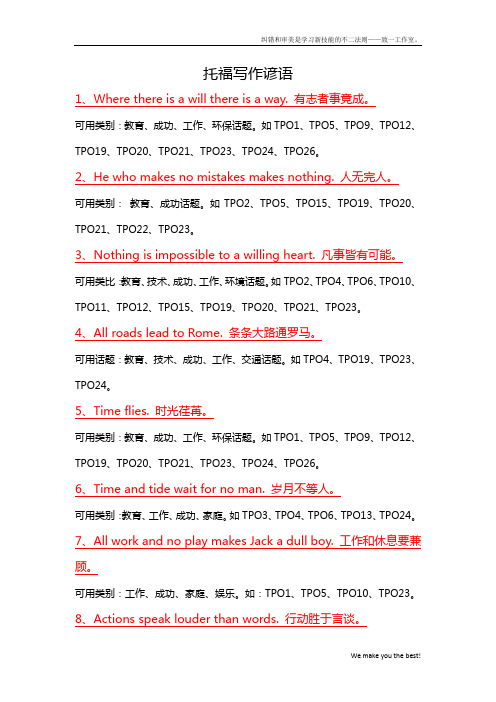
托福写作谚语1、Where there is a will there is a way. 有志者事竟成。
可用类别:教育、成功、工作、环保话题。
如TPO1、TPO5、TPO9、TPO12、TPO19、TPO20、TPO21、TPO23、TPO24、TPO26。
2、He who makes no mistakes makes nothing. 人无完人。
可用类别:教育、成功话题。
如TPO2、TPO5、TPO15、TPO19、TPO20、TPO21、TPO22、TPO23。
3、Nothing is impossible to a willing heart. 凡事皆有可能。
可用类比:教育、技术、成功、工作、环境话题。
如TPO2、TPO4、TPO6、TPO10、TPO11、TPO12、TPO15、TPO19、TPO20、TPO21、TPO23。
4、All roads lead to Rome. 条条大路通罗马。
可用话题:教育、技术、成功、工作、交通话题。
如TPO4、TPO19、TPO23、TPO24。
5、Time flies. 时光荏苒。
可用类别:教育、成功、工作、环保话题。
如TPO1、TPO5、TPO9、TPO12、TPO19、TPO20、TPO21、TPO23、TPO24、TPO26。
6、Time and tide wait for no man. 岁月不等人。
可用类别:教育、工作、成功、家庭。
如TPO3、TPO4、TPO6、TPO13、TPO24。
7、All work and no play makes Jack a dull boy. 工作和休息要兼顾。
可用类别:工作、成功、家庭、娱乐。
如:TPO1、TPO5、TPO10、TPO23。
8、Actions speak louder than words. 行动胜于言谈。
可用类别:教育、工作、成功、朋友、环境、交通。
如:TPO2、TPO5、TPO15、TPO17、TPO18、TPO22。
环球雅思中小学-托福备考必知的50句地道谚语
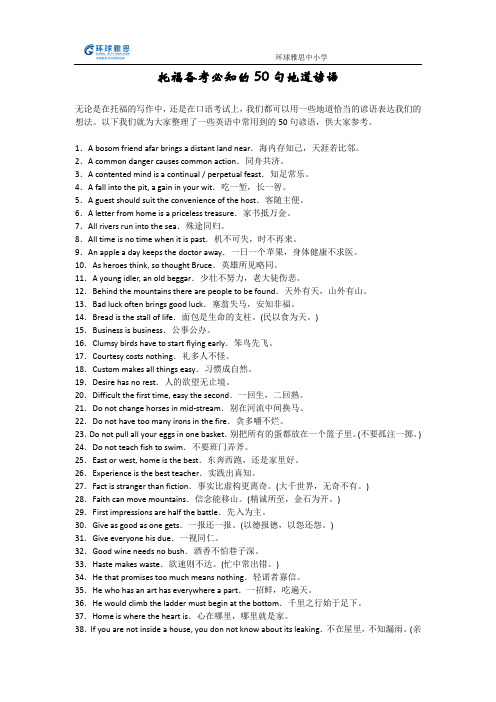
托福备考必知的50句地道谚语无论是在托福的写作中,还是在口语考试上,我们都可以用一些地道恰当的谚语表达我们的想法。
以下我们就为大家整理了一些英语中常用到的50句谚语,供大家参考。
1.A bosom friend afar brings a distant land near.海内存知己,天涯若比邻。
2.A common danger causes common action.同舟共济。
3.A contented mind is a continual / perpetual feast.知足常乐。
4.A fall into the pit, a gain in your wit.吃一堑,长一智。
5.A guest should suit the convenience of the host.客随主便。
6.A letter from home is a priceless treasure.家书抵万金。
7.All rivers run into the sea.殊途同归。
8.All time is no time when it is past.机不可失,时不再来。
9.An apple a day keeps the doctor away.一日一个苹果,身体健康不求医。
10.As heroes think, so thought Bruce.英雄所见略同。
11.A young idler, an old beggar.少壮不努力,老大徒伤悲。
12.Behind the mountains there are people to be found.天外有天,山外有山。
13.Bad luck often brings good luck.塞翁失马,安知非福。
14.Bread is the stall of life.面包是生命的支柱。
(民以食为天。
)15.Business is business.公事公办。
英语作文中可以使用的谚语
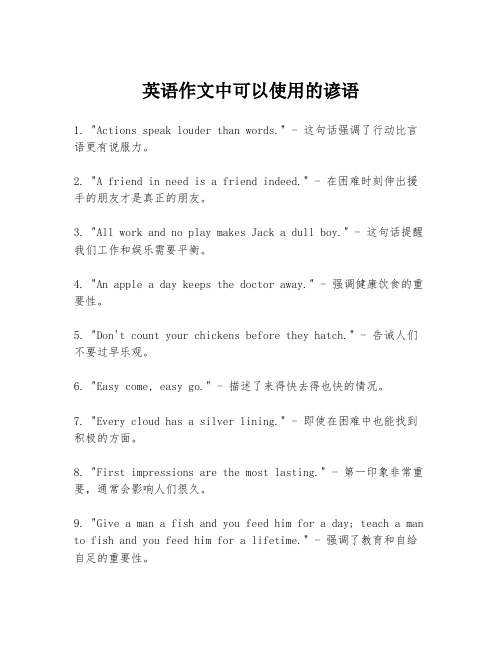
英语作文中可以使用的谚语1. "Actions speak louder than words." - 这句话强调了行动比言语更有说服力。
2. "A friend in need is a friend indeed." - 在困难时刻伸出援手的朋友才是真正的朋友。
3. "All work and no play makes Jack a dull boy." - 这句话提醒我们工作和娱乐需要平衡。
4. "An apple a day keeps the doctor away." - 强调健康饮食的重要性。
5. "Don't count your chickens before they hatch." - 告诫人们不要过早乐观。
6. "Easy come, easy go." - 描述了来得快去得也快的情况。
7. "Every cloud has a silver lining." - 即使在困难中也能找到积极的方面。
8. "First impressions are the most lasting." - 第一印象非常重要,通常会影响人们很久。
9. "Give a man a fish and you feed him for a day; teach a man to fish and you feed him for a lifetime." - 强调了教育和自给自足的重要性。
10. "Honesty is the best policy." - 诚实是最明智的选择。
11. "It's not whether you fall, but how you rise." - 强调了面对失败时的恢复力。
托福写作常用的谚语

太傻网:托福写作常用的谚语小编给大家整理了30句托福写作开头、结尾常用的谚语,能不能巧妙运用就看你记得住不?1. A bad beginning makes a bad ending. 恶其始者必恶其终。
2. A bad padlock invites a picklock. 开门揖盗。
3. People can survive anything but weak will.不怕路远,就怕志短。
4. A bad thing never dies. 坏事传千年。
5. A bad bush is better than the open field. 有胜于无。
6. A beggar's purse is bottomless. 乞丐的钱袋是无底洞。
7. A bad custom is like a good cake, better broken than kept. 坏习惯像鲜馅饼,分食要比保存好。
8. A bad workman quarrels with his tools. 拙匠常怨工具差(人笨怨刀钝)。
9. A bit in the morning is better than nothing all day. 略有胜于全无。
10. A bird is known by its note, and a man by his talk. 闻其歌知其鸟,听其言知其人。
11. A bird may be known by its song. 什么鸟唱什么歌。
12. A bad compromise is better than a good lawsuit. 吃亏的和解也比胜诉强。
13. A bad conscience is a snake in one's heart. 做贼心虚。
14. A bargain is a bargain. 达成的协议不可撕毁。
15. A bird in the hand is worth two in the bush. 双鸟在林不如一鸟在手。
(写作素材)托福写作中的常用谚语总结
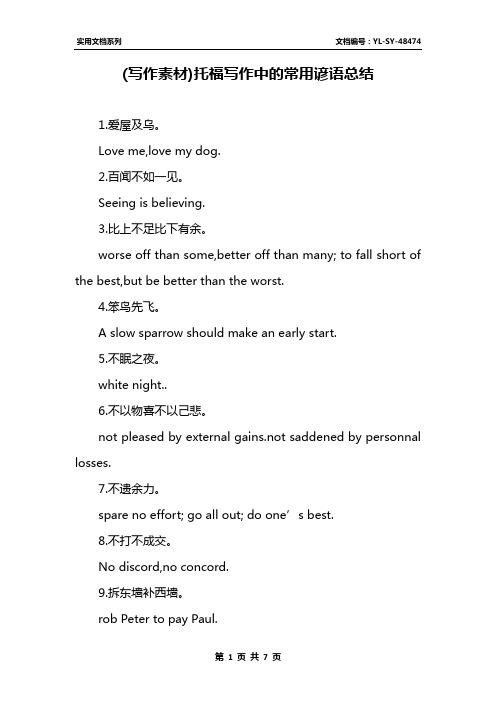
(写作素材)托福写作中的常用谚语总结1.爱屋及乌。
Love me,love my dog.2.百闻不如一见。
Seeing is believing.3.比上不足比下有余。
worse off than some,better off than many; to fall short of the best,but be better than the worst.4.笨鸟先飞。
A slow sparrow should make an early start.5.不眠之夜。
white night..6.不以物喜不以己悲。
not pleased by external gains.not saddened by personnal losses.7.不遗余力。
spare no effort; go all out; do one’s best.8.不打不成交。
No discord,no concord.9.拆东墙补西墙。
rob Peter to pay Paul.10.辞旧迎新。
bid farewell to the old and usher in the new; ring out the old year and ring in the new.托福写作题目:如何提升演讲能力题目:After your presentation, which way would you choose to identify your weakness and improve your presentation?1) reviewing the recording on your own;2) inviting your colleagues or classmates to make suggestions for improvement.托福写作范文:如何提升演讲能力篇1To improve my performance after giving a presentation, it is best to review a recording of it by myself. This process lets me observe all aspects of the presentation, evaluate changes at my own pace, and avoid being defensive.First, a video recording gives significantly more information than just relying on comments made by colleagues or classmates. I can analyze and improve on even small points that others may not have noticed or found worth mentioning. For example, a couple years ago, I gave a presentation that I had extensively prepared for. It had strong organization and flow. Classmates raved about the content,but mentioned that I looked scared. I was confused, because I had felt confident. However, I noticed in the video later that I was continually fingering my notes. For my next presentation, I placed the notes within view but did not hold them, rendering my appearance more professional.Another reason I prefer watching a recording is my pace of learning. I can focus on the points I want to redo, replaying the material as often as I want, confirming even tiny details. In fact, I can even take long breaks to think about what I see or to try out alternate delivery styles. I do not have to inconvenience my friends by asking them for feedback or taking up their time. If others are involved in the evaluation process, I feel much more rushed because I do not want to bother people who have agreed to help me.Finally, reviewing a recording by myself eliminates a serious problem that hinders progress: my pride. I do not like to admit it, but I often get defensive about feedback and want to explain why certain things happened. I feel resentful about negative comments rather than see them as stepping stones towards improvement. It is a natural tendency, but it definitely hinders my ability to assimilate outside feedback. Furthermore, friends try to be polite, so they may not mention minorpointsthat I might have improved because they don’t want to seem too critical. Emotions get in the way of a thorough critique.To improve my future performance, I find it best to review videos of my presentations by myself. I can evaluate all aspects of the presentation, take as much time as I need, and avoid the inevitable problem of emotional involvement swaying the critique.at my own pace 按照自己的步伐走rave about the content 对内容赞不绝口place the notes within view 把笔记放在眼前,把笔记放在视线范围内inconvenience my friends 麻烦我的朋友take up their time 占用他们的时间see them as stepping stones towards improvement 把它们看作是迈向进步的垫脚石get in the way 妨碍,阻碍托福写作范文:如何提升演讲能力篇2It is essential to get the feedback of people in the audience to learn about mistakes and improve on a presentation. Spectator critiques help identify the big picture and reveal points that you can’tsee in an honest, unbiased way.No matter how impartial you want to be, a self-evaluation is biased. It incorporates points that are not relevant to the performance you gave. For example, you may think you did excellent given your limited practice time or great amount of stress, but your audience is unaware of these factors. The viewers only evaluate what they see, which is a far more accurate measure of a presentation. A self-evaluation may also ignore issues that were “just accidents.”However, such points may reallybe important detractors that need to be addressed.People in the audience also provide insight into the big picture. They only have time to note specific glaring details or outstanding highlights. Otherwise, their feedback gives you the overallimpression of the performance, which is something intangible and essential to the presentation’ssuccess. If you compare the feedback of several observers, you can isolate the main patterns. As a result, you can understand the most important parts that need changed. If you only refer to a video on your own, you may get caught up changing minor details rather than addressing the key elements that are needed to alter the overall flow or lasting effect.Finally, classmates or colleagues may identify things you take for granted such as mannerisms, repeated words, or evenproblems with visual aids. One example is a teacher who gave a presentation using an old slide projector that kept jamming. The teacher apologized when that happened and kept going with the lecture. He had no idea how distracting it was, to the point that students remembered joking about which slide would get stuck next better than they remembered the content. The teacher, however, was so used to fixing the projector that he barely noticed it. The feedback showed him the value of replacing his visual aids with newer equipment, an issue he had never considered was important.Since an audience gives you honest evaluations of the overall impression of a presentation and identifies points you may not see on your own, it is important to get feedback from people in the audience in order to improve your presentations.spectator critiques 旁观者的评论in an honest, unbiased way 以诚实、公正的方式a far more accurate measure of a presentation 对报告或展示一种更为准确的评价provide insight into the big picture 洞察全局glaring details 明显的细节outstanding highlights 突出的亮点visual aids 视觉辅助【写作素材】托福写作中的常用谚语总结。
- 1、下载文档前请自行甄别文档内容的完整性,平台不提供额外的编辑、内容补充、找答案等附加服务。
- 2、"仅部分预览"的文档,不可在线预览部分如存在完整性等问题,可反馈申请退款(可完整预览的文档不适用该条件!)。
- 3、如文档侵犯您的权益,请联系客服反馈,我们会尽快为您处理(人工客服工作时间:9:00-18:30)。
托福作文常用谚语
1.Bird
(1) Kill two birds with one stone. 一箭双雕;一举两得。
(2) A bird in the hand is worth two in the bush. 双鸟在林不如一鸟在手。
(3) Birds of a feather flock together. 物以类聚,人以群分。
(4) It’s an ill bird that fouls own nest. 家丑不可外扬。
(5) Fine feathers make fine birds. 人要衣装,马要鞍。
2. Cat
(1) A cat has nine lives.猫有九条命;吉人天相。
(2) Cats hide their claws. 知人知面不知心。
(3) All cats are grey in the dark. 黑暗之中猫都是灰色的。
(人未出名时看起来都差不多。
)
(4) A gloved cat catches no mice. 戴手套的猫,老鼠抓不到。
(不愿吃苦的人成不了大事业。
)
3. Chicken
(1) Don’t count your chickens before they’re hatched. 鸡蛋未孵出,先别数小鸡。
(不要过早乐观。
)
4. Crow
(1) A crow is never the whiter for washing herself often. 江山易改,本性难移。
5. Dog
(1) He who would hang his dog gives out first that it is mad. 欲加之罪,何患无词。
(2) A staff is quickly found to beat a dog with. 欲加之罪,何患无词。
(3) Love me, love my dog. 爱屋及乌。
(4) Too much pudding will choke a dog. 布丁太多噎死狗。
